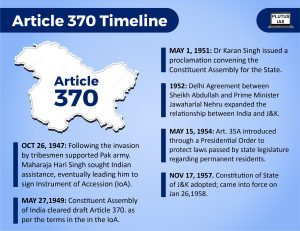13 Dec Supreme Court upholds Abrogation of Article 370
This article covers “Daily Current Affairs” and the topic details “ Supreme Court upholds Abrogation of Article 370”. This topic has relevance in the Polity and Governance section of the UPSC CSE exam.
GS 2: Polity and Governance
Why in the news?
A five-judge bench of the Supreme Court has upheld the Abrogation of Article 370
Background:
Following the abrogation of Article 370, several petitions were submitted challenging this decision. On August 28, 2019, the Supreme Court acknowledged these petitions and decided to hear them. To address the legal challenges surrounding the abrogation of Article 370 and the subsequent bifurcation of Jammu and Kashmir into two Union Territories, the Supreme Court formed a five-judge bench.
The Supreme Court recently delivered its verdict on the Union government’s 2019 move to amend Article 370 of the Constitution, which resulted in the abrogation of the special status granted to the erstwhile state of Jammu and Kashmir. The court’s decision validated the Constitutional order that revoked Article 370.
Key Highlights of the Judgement:
- Unique Status of Jammu and Kashmir:
-
-
- The Supreme Court asserted that Jammu and Kashmir did not retain any element of sovereignty after its accession to India in 1947.
- Despite an initial proclamation by Maharaja Hari Singh to retain sovereignty, his successor, Karan Singh, issued a proclamation stating that the Indian Constitution would prevail over all other laws in the state.
- A proclamation on November 25, 1949, by Yuvraj Karan Singh, repealed the Government of India Act, 1935, and affirmed the applicability of the Indian Constitution to Jammu and Kashmir.
- The court emphasized that Jammu and Kashmir has always been an integral part of India.
-
- Statehood Restoration:
-
-
- The court deemed the reorganization of the erstwhile state into Union Territories in 2019 as a temporary measure.
- It directed the Centre to work towards the restoration of statehood and the conduct of Legislative Assembly elections.
-
- Article 370 – Temporary Provision:
-
-
- The Supreme Court clarified that Article 370 is a temporary, transitional provision.
- It highlighted that the temporary provision served a specific purpose during the war-like situation in the state in 1947.
-
- Abrogation of Article 370:
-
-
- The court upheld both presidential proclamations of August 2019, which effectively abrogated Article 370.
- It referred to the 1994 ruling in ‘SR Bommai v Union of India,’ stating that the President’s orders were not prima facie malafide or an extraneous exercise of power during President’s rule.
-
- Truth and Reconciliation Commission:
-
- Justice Sanjay Kaul recommended the establishment of a Truth and Reconciliation Commission to investigate alleged human rights violations by both state and non-state actors in Jammu and Kashmir.
- The commission would serve as an official mechanism to acknowledge and address past wrongdoings for the resolution of historical conflicts.
Article 370: A Chronological Overview
- Article 370, residing in Part XXI of the Constitution, pertains to ‘Temporary, Transitional and Special Provisions.’ It grants special autonomy to the region of Jammu and Kashmir (J&K) within the Indian constitutional framework.
Timeline:

- Constitutional Provision:
-
-
- Article 370 exempts J&K from the applicability of most parts of the Indian Constitution.
- It allows the state to draft its own Constitution and places restrictions on Parliament’s legislative powers.
-
- Abrogation of Article 370:
-
- On August 5, 2019, the Indian government took a historic step by revoking nearly all of Article 370.
- The President issued The Constitution (Application to Jammu And Kashmir) Order, 2019, replacing ‘Constituent Assembly’ with ‘Legislative Assembly [of Jammu & Kashmir]’ in Article 370(3).
- While technically amending the interpretation clause Article 367, the order utilized Article 370(1) for this purpose.
- A Statutory Resolution in the Rajya Sabha abrogated most of Article 370, made possible during President’s rule in the state.
- On August 6, 2019, Parliament passed the Jammu and Kashmir Reorganisation Bill, 2019, leading to the bifurcation of the state into two Union Territories: Jammu & Kashmir and Ladakh.
- Jammu & Kashmir was provided with a legislative assembly.
Download plutus ias current affairs eng med 13th Dec 2023
Q.1 With reference to the Supreme Court’s verdict on Article 370, consider the following statements:
- The Supreme Court affirmed that Jammu and Kashmir retained an element of sovereignty after its accession to India in 1947.
- Karan Singh’s proclamation to retain sovereignty was upheld by the court.
- The reorganization of Jammu and Kashmir into Union Territories in 2019 was deemed a permanent measure by the court.
How many of the above statement/s is/are correct?
(a) Only one
(b) Only two
(c) All three
(d) None
ANSWER: D
Q.2 Discuss the implications and significance of the Supreme Court’s verdict on the abrogation of Article 370 in Jammu and Kashmir. Analyze the constitutional and historical aspects involved in the decision, considering the legal framework and the court’s reference to previous rulings.



No Comments